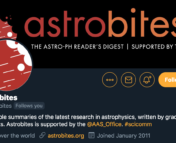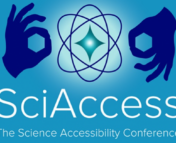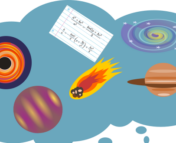This post is part of our series meant to showcase the various types of outreach activities you can do as a graduate student, as an undergraduate, or as an astronomer at any stage of your career! In each post, we’ll focus on one national organization and one local group.
National: Skype a Scientist (by Briley Lewis)
What is Skype a Scientist?
Skype a Scientist is a program that pairs scientists of all kinds with classrooms and other groups, run by squid-scientist-extraordinaire Dr. Sarah McAnulty and collaborators. Their goal is to “give students the opportunity to get to know a real scientist and get the answers to their questions straight from the source.” Scientists can sign up to be matched with groups, teachers and families that want to talk with them, and vice versa (e.g. teachers can sign up to be matched with a scientist). And to be clear, if you are a grad student — YES, you are a scientist! Not only do they want volunteers from different scientific fields, but you can also be at different career stages. Skype a Scientist has recently expanded to host some other events, too, like weekly science trivia (for adults) and Skype a Scientist Live sessions where anyone can tune in!
Why did you sign up for Skype a Scientist?
I’ve always liked sharing science with people who don’t usually get to see it up close. I’m the only professional scientist in my family, and I notice that the actual day-to-day of how science works and what scientists do is really poorly understood. 81% of Americans can’t name a living scientist, and Skype a Scientist is a great way to put faces and personalities to the current scientific efforts they hear about and help bridge this divide.
What do you do in Skype a Scientist?
As the scientist, you plan a time to Skype/Zoom with a class, and then show up! It’s up to you and the teacher you’re working with to decide if you want to give a short presentation to the students, or just do Q&A. I’ve personally found that students usually have a TON of questions (especially the younger ones), and that can easily take up the whole time! It’s really great to feel students’ energy and excitement about your area of science, and they often ask really interesting and creative questions, too.
This sounds interesting! How can I get involved?
From the scientist’s side, you can sign up to be matched with this form. If you’re a teacher or other individual interested in getting a scientist to speak with your group, check out their other ways to get involved and request a scientist! If you’re not actually interested in participating but this sounds like an effort you want to support, they accept donations, have a Patreon, and even sell cool merch.
Local: Dark Skies, Bright Kids (by Abby Waggoner)
What is Dark Skies, Bright Kids?
Dark Skies, Bright Kids (DSBK) is a volunteer organization run primarily by astronomy graduate students at the University of Virginia. DSBK’s mission is “to foster the natural curiosity of children in the community [particularly in underserved areas] by helping them to explore the Universe in a social setting with fun, hands-on activities.” While DSBK interacts with the community through a multitude of events, such as volunteering with the local Discovery Museum and hosting an annual Star Party with telescopes and constellation tours, our main function is to host after-school and summer clubs. During clubs, children are introduced to a number of astronomy topics ranging from the Solar System to Astrobiology to the Electromagnetic Spectrum. To ensure that our lessons are accessible to all children, every event DSBK does is completely free.
In a previous bite, I covered DSBK’s mission more thoroughly, along with how the organization transitioned to a virtual world during 2020-2021, but here I would like to highlight some ways that resources developed by and experiences of DSBK can be used in your own local community.
Why did you sign up for DSBK?
The majority of astronomers identify as white men, whereas women and other genders and minorities are drastically underrepresented in the field. DSBK’s mission is to bring science to underserved and underrepresented individuals in STEM, who otherwise might not have had the opportunity to experience a ‘science camp.’ The ideals of DSBK speak very close to my heart, as I come from an area with very few opportunities to explore science (for example, my high school did not even offer a physics course). When I volunteer with DSBK, I often see myself in the excited children learning science concepts they otherwise might not have been exposed to. We have reached over 24,000 children over 12 years, and I cannot help but wonder which of them may become scientists in the years to come.
How can I introduce astronomy to my local community?
Unfortunately, every community has different resources and experiences, so there isn’t a single answer to this question. Establishing or organizing an outreach program can be challenging (or even a full time job), so if you are interested in science outreach it may be easier to join already established programs.
Below I’ve included a small list of locations where DSBK has had the most success in establishing connections with our community. Note that this list is not comprehensive and your success in finding events or establishing connections will greatly depend on your area.
- Reach out to local museums or libraries. These locations are often looking for organizations to teach lessons or volunteer at camps and events. Organizations such as these are also likely to host larger events, where you could possibly volunteer without having to organize anything.
- Contact a local after-school program. After school clubs are a very popular place to volunteer, and many even have established events that you could join. Some great examples of after-school organizations (at least in the United States) include the Boys and Girls Club and the YMCA.
- Find out if your community has a local Astronomy Club. Many cities may have a club for amateur astronomers, and these clubs may be a good resource to create connections in your community.
I will note that I did not include schools in this list, as there are often many regulations around working with schools, and if you are not already a part of an established organization it can be challenging to volunteer within a school system.
Are there any resources I can use to teach astronomy?
Yes! There are a multitude of resources, lesson plans, and even YouTube tutorials on astronomy and science activities for children, including activity sheets produced by DSBK volunteers. In my personal experience, many adults have as much fun doing the activities as the kids. If you are interested in leading astronomy activities, the DSBK activity sheets are a great free resource, as they provide a step by step tutorial on concepts such as rockets, the Solar System, stars, galaxies, and more. A number of our activities are also available in Spanish, and we are in the process of translating even more resources. All of the activities can be done at home with everyday supplies, so you don’t need any special equipment or supplies to do them.
Astrobite edited by: Katya Gozman
Featured image credit: Skype a Scientist




